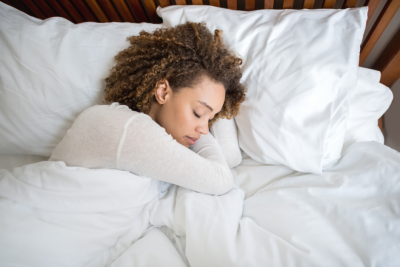What is Sleep Health?
Sleep health is characterized by one's awareness and interactions with the environment. Healthy sleep includes: adequate sleep time, regular timing - day/night, few awakenings at night, high satisfaction, and high daytime alertness.

Recommended Sleep Duration
Age Group
Age
Sleep Recommended Daily
Newborn
0-3 months
14-17 hours
Infant
4-12 months
12-16 hours (including naps)
Toddler
1-2 years
11-14 hours (including naps)
Preschool
3-5 years
10-13 hours (including naps)
School Age
6-12 years
9-12 hours
Teen
13-17 years
8-10 hours
Adult
18-60 years
7 or more hours
Adult
61-64 years
7-9 hours
Adult
65 years and older
7-8 hours
Source: CDC; Table developed by CDC1
Common MYTHS About Sleep
You need less sleep as you age
While it is common for circadian rhythms to change as we age, adults still need sleep. Often, older adults struggle to get good quality sleep and for a long enough duration for their body to recover and be active for the next day.
You can “cheat” on the amount of sleep you get
Your body needs uninterrupted time to sleep so your body and brain can recover through the sleep stages. Lack of sleep can negatively affect cognitive and bodily functions such as memory, focus, and digestion. While naps may help decrease daytime sleepiness, they are not a substitute for sleep and can disrupt your circadian rhythm.
Turning on the radio, opening the window, or turning on the air conditioner are effective ways to stay awake while driving
Drowsy driving is unsafe and it can take only a moment of inattentive driving to be a danger to yourself and others.
Sleep disturbance is a normal part of aging
As you age, life can get busier and you may be awoken by anxiety, pain, or environmental factors. Adjustments in lifestyle can reduce sleep disturbances. Uninterrupted sleep is a necessity for healthy functioning.
Snoring is common, but it is not harmful
While some light snoring may not be harmful, snoring that is loud and frequent may be a sign of a sleep disorder. Loud snoring can wake both you and anyone that can hear the snoring up, as well as, not provide the body with enough oxygen. If you suspect that you may have a snoring issue, consult your primary care provider.
The best way to fall asleep when you wake in the middle of the night is to count sheep or toss and turn until you fall asleep
If you can't fall back asleep, it may be better to get out of bed and do a relaxing activity. Light activity can tire the brain out enough to go back to sleep. It can also allow the brain to associate your bed with sleeping.